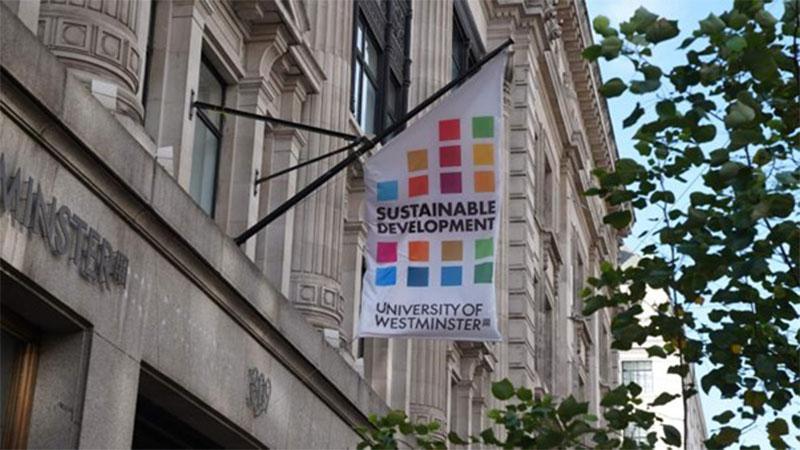The University of Westminster has published its Sustainable Development Goals (SDGs) report 2023-2024, outlining how the University has embedded SDGs into teaching, research and operations over the 2023/24 academic year to help support a more sustainable society.

The 17 Sustainable Development Goals (SDGs) were created by the United Nations in 2015 to provide achievable aspirations to guide people and organisations on how to create a more sustainable future. Westminster adopted these SDGs in 2019, embedding them into teaching, research and operations, while using the goals to frame the University’s strategic decisions to support its commitment to being progressive, compassionate and responsible. In doing this, Westminster has been recognised as one of the top 15% out of over 1,400 universities globally for its work on contributing to these 17 SDGs. The report highlights the ways in which the University has worked to achieve each of these goals.
Westminster has prioritised the integration of sustainable development across its entire undergraduate and postgraduate curriculum, ensuring that all students gain exposure to sustainability concepts and challenges. Since September 2024, every final-year undergraduate course at Westminster includes an assessment component tied to at least one of the SDGs, reinforcing sustainability as a shared value across disciplines.
For example, International Relations and Development BA Honours students can take on modules that look at the evolution of partnerships between states, markets and NGOs in implementing the SDGs. The course also teaches the politics of designing practical and actionable programmes to deliver the SDGs and gives students the chance to engage in workshops with NGOs, aid workers and diplomats who work with refugees and internally displaced persons. Similarly, the Biological Sciences BSc Honours course offers Designing a Sustainable World as a core module, which is also available as an optional module for Biochemistry BSc Honours students. The module allows students to explore the environmental, social and economic foundations of sustainability. In this course, students propose their own sustainable solutions through grant proposals and business pitches, applying scientific knowledge to tackle real-world issues.
Westminster has also incorporated sustainability into its research and knowledge exchange. This commitment was demonstrated during the first-ever Teaching and Research Day, where colleagues from across the University, including Vice-Chancellor and President Professor Peter Bonfield, gathered to discuss accessibility and inclusivity in research and education. Participants shared insights from successful Westminster projects and highlighted best practices already shaping the future of sustainable education.

Teaching and Research Day
Students are actively involved in research initiatives, often partnering with faculty members to develop solutions for sustainability challenges. One such project, led by Dr Gustavo Espinoza Ramos, invited students to collaborate with Westminster academics to explore the potential of artificial intelligence in higher education. This initiative highlights Westminster’s approach to ensuring that students are integral to the University’s academic and research processes and shows the importance of blended learning.
During the 2023-24 academic year, the Quintin Hogg Trust funded a variety of sustainability projects. Among them were initiatives such as using virtual reality to teach sign language and a Work-Based Learning project that gave Data Science students the opportunity to apply their skills to real industry problems. As part of this project, students analysed global environmental data through various lenses and presented their findings to Koru Impact Solutions, a UK-based FinTech firm specialising in sustainable investments.
In addition to academic initiatives, Westminster has worked to make its physical campuses more sustainable. Solar panel installations at the Harrow Campus generated over 3,000 kWh of electricity in 2023, enough to power an electric vehicle from London to Cairns, Australia. Solar thermal installations at Harrow also produced nearly 60,000 kWh, offsetting the heating energy needs for several blocks of student residences. Throughout the year additional solar panels were also installed at both the Harrow and Marylebone campuses. The panels at Marylebone alone are expected to generate over 78,000 kWh annually, which is approximately 3.5% of the University's total electricity usage. Together, these installations will reduce the University’s carbon footprint by about 15.2 tonnes of CO2 each year, equivalent to planting nearly 700 trees annually.
Aligned with SDG 2: Zero Hunger, Westminster has taken steps to promote food sustainability. In June 2024, the University hosted the World Public Health Nutrition Congress in partnership with the World Public Health Nutrition Association. The event brought together over 600 experts from 66 countries, representing fields such as nutrition, public health, human rights, agriculture, climate change and governance. The congress addressed critical questions around nutrition, aiming to strengthen evidence-based actions to improve nutritional health, particularly for the world’s most vulnerable populations.
Along with this, Westminster’s Cavendish Living Lab received £40,000 from the Greener Futures Fund to deliver interactive workshops on food sustainability to approximately 780 students across six secondary schools. These workshops cover the entire food journey, from production and worker conditions to carbon footprints and food preservation. In addition to educating students, the project will train colleagues to carry out similar workshops in the future, creating a ripple effect of awareness and action on food sustainability.

The University of Westminster’s SDGs report underscores its holistic approach to sustainability, from curriculum innovations and campus operations to global partnerships. The University remains dedicated to integrating these goals into its strategic priorities, inspiring students, colleagues and partners to contribute to a sustainable future.
Holly Jones, Interim Head of Sustainability at the University of Westminster, said: “The Sustainability Team always enjoys writing and publishing our annual SDGs report. It’s great to see so much of the activity that takes place across the University each year contributing to sustainable development. This year, we’ve been particularly impressed by so many of our students leading their own projects, and we hope to see this continue to grow in the future. As always, we encourage all colleagues and students to share their stories with us by contacting the Sustainability Team.”
Read the full Sustainable Development Goals (SDGs) report 2023-2024 published by the University of Westminster.
Find out more about Sustainable Development at the University of Westminster.


